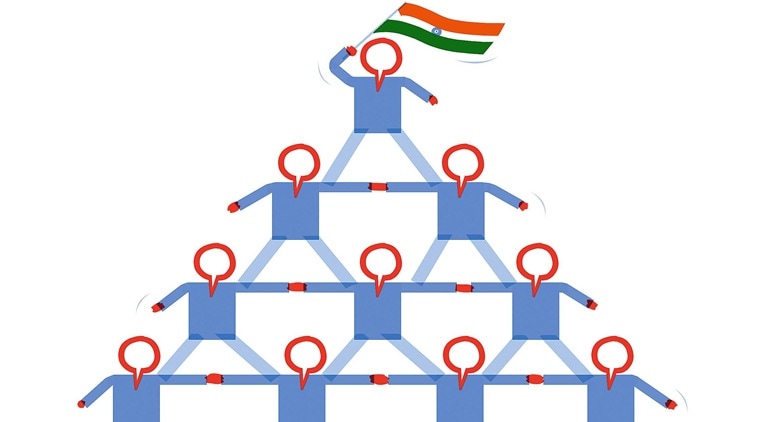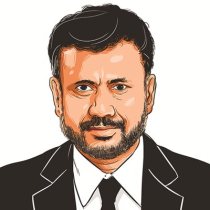My mulk at 71
In my film, I tried to deal with the issues of social harmony that have been on my mind for three decades. As Indians, we must ask these questions, even if there is no single answer.

Seventy-two years into our Independence, I wonder if we really understand what freedom should mean to us. (Illustration: CR Sasikumar)
Independence Day is probably the most significant day in the history of modern India. On August 15, 1947, at the stroke of midnight, India’s first Prime Minister Pandit Jawaharlal Nehru announced India’s freedom from British rule. A new country was born when most of us were not even born. We were to read in history books everything that brought this day into being. Arguably, the struggle for independence started 40 miles from Delhi in Meerut in 1857, where a battalion of sepoys revolted against the British rule. Then in 1914, arrived a hard-willed Indian from South Africa, who would later be known as Bapu. Mohandas Karamchand Gandhi was ironically shot and killed by an Indian soon after the country won its freedom.
Gandhi was not the only one who fought the battle for freedom. There were many more that we know of and I am convinced that there were countless more who sacrificed more than we can ever imagine, who gave up their lives to see the Indian flag fly high. Some of them are still celebrated in our hearts and in the streets. There are roads, memorials, towns and various other monuments named after such greats.
The earliest memory of Independence Day celebrations that most of us will have is probably a loudspeaker in the neighbourhood playing some songs celebrating the country: “Insaaf ki dagar pe bachchon dikhaao chal ke” or “Vande maatram, sujalam sufalaam, malyaja sheetalaam”, and many others. Then children go to school in their ironed uniforms to line up for the flag hoisting. As the flag unfurls, some flowers fly out and we sing “jana, gana mana”, praising the country. Back home, parents watch the prime minister address the nation from the Red Fort in Delhi. By noon, it is a holiday. Families go out for movies or to visit relatives. India’s box offices sell some of the highest numbers of movie tickets this day.
Thousands of Indians earned Independence for us by 1947. It took them roughly 100 years of a bloody, relentless struggle to achieve this. Seventy-two years into our Independence, I wonder if we really understand what freedom should mean to us.
Before 1947, Indians worked for foreigners who used our manpower and resources for their kingdom. The struggle for Indian independence was to make sure each and every bit of Indian manpower and resources worked for the well-being of India which, in turn, will work for the well-being of every Indian. This is a cycle. This is how nations are built. And the rest of the world looks at you, and says, “what a country”. This is what we take pride in. This is what our flag represents — our fulfilled duties for the country and the country’s love for you.
When we build a home, at first, it is just a piece of land. We build the walls based on which family member needs how much space, set the rooms up for the comforts of the family, the doors for privacy and security. Each member plays his or her part in building this home. Then we post pictures of this home on Instagram and Facebookwith great pride. These pictures are the celebration of what we did to make this house. Years later, these images overwhelm us. We cry remembering how much went into building the home. You save these images in your mind.
India is like this. Our forefathers built it, they got us Independence. They built the walls and the doors and the windows as best as they could. They even wrote down the rules of the house in a book called the Constitution of India. States were formed, the legislative assemblies were formed for each state and a mechanism was created to make sure every Indian worked for the well-being of India and India would work for the well-being of each Indian. This, to me, is the significance of Independence Day. We commemorate this day to celebrate this arrangement each year with fervour and gusto.
But is this just a day-long affair? Actually, just half a day and the rest of it in a movie theatre or a crowded restaurant? I suspect this is a year-long affair. We should be building the nation 364 days a year and celebrate it on the 365th. Then, and only then, do we deserve the celebrations. Our forefathers played their part and departed. We have only inherited this Independence.
Strangely, Independence Day is also a sort of dependence day. Is food reaching everyone? Is education reaching everyone? Is medicine reaching everyone? Are the senior citizens getting enough care? Are our governments taking good care of the nation? Did we choose the right governments? How can we help our governments work better for us? How much should we know about our country? How can I help? Is stopping at the traffic light a contribution to building a nation? Is respecting a queue in a public place my contribution?
Do these questions bother you? They should because the answers to these questions build a nation that represents us. The flag is just its celebration that stands on the ground that we build.
There were many such questions that were brewing inside me for at least three decades. I did not know how to deal with them. The biggest one was around social harmony. Not just communal harmony, but also caste harmony and many other such divides. I wanted to pose these questions to my fellow countrymen. I realised that there was no single answer. I realised that all of us had to work individually towards finding them. The most important task was to pose these questions.
Then, a lot of newspaper headlines over the past few years inspired a story. Suddenly, I had the opportunity to take some of these questions to the people. I had to make this film. Friends, to begin with, discouraged me. I was known for popular Bollywood recipe and this project belonged to a different palette. I persisted, and over three days ended up writing a hundred pages. This was the first draft of Mulk. The same friends read it and this time they saw how passionately I felt about these questions. That day, the film took off. We were making it.
I received immense love from the team while we were making the film. But there were apprehensions about the CBFC and even the audience. Both surprised me. The CBFC did not ask me to change anything and audiences lapped it up. Especially the journalists. Even those who never write on entertainment ended up writing pieces on Mulk. They thought it was brave, essential, important. Most reviews ended up thanking me for making the film. I haven’t received as much love for any work as I have over the last 10 days or so, especially from my fellow directors. They not only wanted to call and congratulate me but also to hug me. Those hugs are the biggest earning of my life so far.
Overall, what is clear is that my countrymen agreed with the questions. They agreed that they were ignoring these questions. They found it brave and essential because I posed them. Another point of joy is that they want to address these questions, they want to answer them.
Governments will come and go. They are chosen to be the keepers of this great nation that has existed for thousands of years despite the most impossible diversity. We, the people, make this nation a great nation. Our Independence from foreign rule was to make sure we could depend on each other, to co-exist and help each other.
John F Kennedy famously said, “Don’t ask what your country can do for you, ask what you can do for your country.”
Happy Independence Day. Let’s create an environment where we can depend on each other.
The writer, a film-maker, is director of Mulk.
For all the latest Opinion News, download Indian Express App







































No hay comentarios:
Publicar un comentario